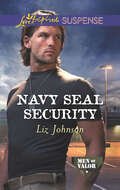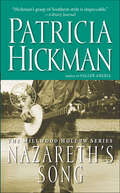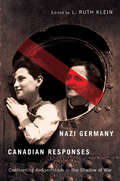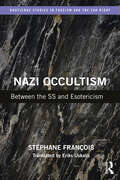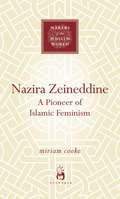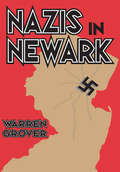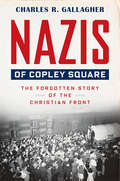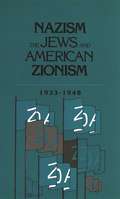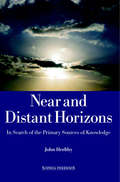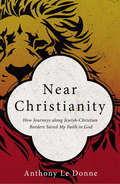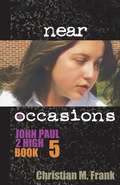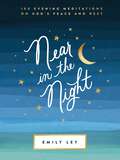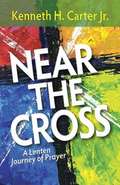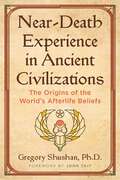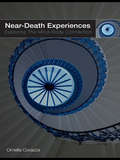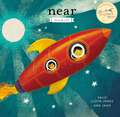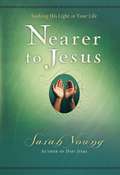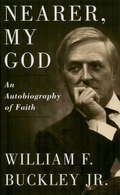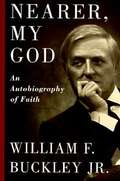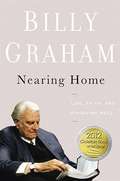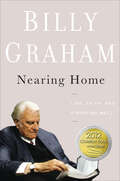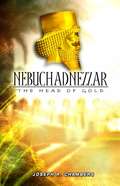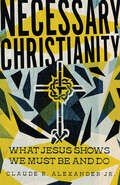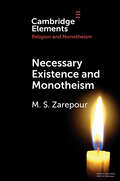- Table View
- List View
Navy SEAL Security (Men of Valor)
by Liz JohnsonIn this inspirational romantic suspense, an injured marine puts his pretty doctor under his protection when she is pursued by an unknown assailant. Wounded navy SEAL Luke Dunham’s only goal is returning to active duty . . . until he rescues his physical therapist from a lethal attack. Now he’ll risk everything—even his recovery—to keep Mandy Berg’s attacker at bay. Mandy’s been burned before when she trusted the wrong man. And she knows better than to develop feelings for one of her patients. Yet how can she help falling for a man who does not hesitate to put his strength, his skill and his very life in harm’s way to keep her safe? Relying on anyone feels dangerous . . . but turning away Luke’s protection could be deadly.
Nazareth's Song (Millwood Hollow #2)
by Patricia HickmanThe further adventures of a drifter-turned-pastor and a trio of loveable orphans in this second installment of her series.
Nazi Germany, Canadian Responses
by L. Ruth KleinIt has been thirty years since the publication of Irving Abella and Harold Troper's seminal work None is Too Many, which documented the official barriers that kept Jewish immigrants and refugees out of Canada in the shadow of the Second World War. The book won critical acclaim, but a haunting question remained: Why did Canada act as it did in the 1930s and 1940s? Answering this question requires a deeper understanding of the attitudes, ideas, and information that circulated in Canadian society during this period. How much did Canadians know at the time about the horrors unfolding against the Jews of Europe? Where did their information come from? And how did they respond, on both public and institutional levels, to the events that marked Hitler's march to power: the 1935 Nuremberg Race Laws, the 1936 Olympics, Kristallnacht, and the crisis of the MS St Louis? The contributors to this collection - scholars of international repute - turn to the wider public sphere for answers: to the media, the world of literature, the university campus, the realm of international sport, and networks of community activism. Their findings reveal that the persecutions and atrocities taking place in Nazi Germany inspired a range of responses from ordinary Canadians, from indifference to outrage to quiet acquiescence. It is challenging to recreate the mindset of more than seventy years ago. Yet this collection takes up that challenge, digging deeper into archives, records, and testimonies that can offer fresh interpretations of this dark period. The answer to the question "why?" begins here. Contributors include: Doris Bergen, Chancellor Rose and Ray Wolfe Chair in Holocaust Studies, University of Toronto, Richard Menkis, Department of History, University of British Columbia; Harold Troper, Department of Theory and Policy Studies in Education, OISE/University of Toronto; Amanda Grzyb, Faculty of Information and Media Studies, University of Western Ontario; Rebecca Margolis, Centre for Canadian Jewish Studies, University of Ottawa; Michael Brown, Department of Languages, Literatures and Lingustics, York University; Norman Ravvin, Institute for Canadian Jewish Studies, Concordia University; and James Walker, Department of History, University of Waterloo.
Nazi Germany, Canadian Responses: Confronting Antisemitism in the Shadow of War
by L. Ruth KleinIt has been thirty years since the publication of Irving Abella and Harold Troper's seminal work None is Too Many, which documented the official barriers that kept Jewish immigrants and refugees out of Canada in the shadow of the Second World War. The book won critical acclaim, but a haunting question remained: Why did Canada act as it did in the 1930s and 1940s? Answering this question requires a deeper understanding of the attitudes, ideas, and information that circulated in Canadian society during this period. How much did Canadians know at the time about the horrors unfolding against the Jews of Europe? Where did their information come from? And how did they respond, on both public and institutional levels, to the events that marked Hitler's march to power: the 1935 Nuremberg Race Laws, the 1936 Olympics, Kristallnacht, and the crisis of the MS St Louis? The contributors to this collection - scholars of international repute - turn to the wider public sphere for answers: to the media, the world of literature, the university campus, the realm of international sport, and networks of community activism. Their findings reveal that the persecutions and atrocities taking place in Nazi Germany inspired a range of responses from ordinary Canadians, from indifference to outrage to quiet acquiescence. It is challenging to recreate the mindset of more than seventy years ago. Yet this collection takes up that challenge, digging deeper into archives, records, and testimonies that can offer fresh interpretations of this dark period. The answer to the question "why?" begins here. Contributors include: Doris Bergen, Chancellor Rose and Ray Wolfe Chair in Holocaust Studies, University of Toronto, Richard Menkis, Department of History, University of British Columbia; Harold Troper, Department of Theory and Policy Studies in Education, OISE/University of Toronto; Amanda Grzyb, Faculty of Information and Media Studies, University of Western Ontario; Rebecca Margolis, Centre for Canadian Jewish Studies, University of Ottawa; Michael Brown, Department of Languages, Literatures and Lingustics, York University; Norman Ravvin, Institute for Canadian Jewish Studies, Concordia University; and James Walker, Department of History, University of Waterloo.
Nazi Occultism: Between the SS and Esotericism (Routledge Studies in Fascism and the Far Right)
by Stéphane FrançoisNazi Occultism provides a serious scholarly study of a topic that is often marred by sensationalism and misinformation. The Morning of the Magicians by Pauwels and Bergier (1960) gave rise to the idea that a secret society with wide powers, the "Thule society", was the hidden and ignored centre of Nazism. The influence of this very real small group is, however, only a fantasy, a myth. The author, a historian specializing in neo-Nazism, looks back on this speculative construction, its origins, its ideological tinkering and the practices which have succeeded in forming a sort of radical and sulphurous counterculture which has created a fascination with esotericism and Nazism and the SS. To better understand it, he also paints a portrait of some of the authors who contributed to this extremist subculture, such as the Italian esotericist Julius Evola, the Argentine anthropologist Jacques-Marie de Mahieu, Chilean neo-Nazi Miguel Serrano, and the writer Jean-Paul Bourre. This book will appeal to scholars, researchers and activists as well as general readers with an interest in the history of Nazism and the occult.
Nazira Zeineddine: A Pioneer of Islamic Feminism (Makers of the Muslim World)
by Miriam CookeIn 1928, a young Lebanese woman, Nazira Zeineddine al-Halabi, wrote a book called "Unveiling and Veiling", an indictment of patriarchal oppression in which she boldly stated that the veil was un-Islamic, directly challenging the teachings of "wiser" male scholars. Considered by many an attack on Islam, it rocked the Muslim world and was banned by many clerics, although it quickly went into a second edition and was translated into several languages. In this latest addition to Makers of the Muslim World series, Miriam Cooke offers an intimate portrait of the life and work of this pioneering champion of Islamic feminism. Miriam Cooke is Professor of Modern Arabic literature and Culture at Duke University.
Nazis in Newark
by Warren Grover""Well researched, readable, and very interesting"" --Choice ""Nazis in Newark is a model local history that reaches well beyond the border of Essex County, New Jersey, to the national and international arenas. By recounting so many sides of the complicated encounter between Nazis and Jews in Newark, Warren Grover has fashioned a world of street politics, boycotts, Nazi louts and Jewish bruisers that is as compelling and telling in its detail as any grand tome on the supposed failures and successes of American Jewish resistence to the Holocaust... I recommend Nazis in Newark. I intend to use it as a cornerstone of my teaching for some time to come."" --Professor Michael Alexander The Jewish Quarterly Review ""Very few people today realize that the U.S. mainland was the scene of battles against the Nazis. Warren Grover has produced an outstanding work on this subject. The writing is incisive, the ideas are both original and insightful and the thesis masterfully developed and executed. Must reading for anyone interested in American history and ethnic studies."" --William B. Helmreich, CUNY Graduate Center and author of The Enduring Community ""Thanks to tenacious research and deft story-telling, Warren Grover has put the politics of extremism in one city in the shadow of Fascism, Nazism and Communism, and has thus illuminated the terrible dilemmas of the 1930s. His book also compels the reader to consider an historical anomaly: champions of the Third Reich come across as victims whose civil liberties were infringed, and the gangs of Newark responsible for these violations tended to be Jewish. Such ironies make Nazis in Newark worth the interest of anyone intrigued by ethnic conflict and politcal violence in urban America."" --Stephen Whitfield, Max Richter Professor of American Civilization, Brandeis University ""In this fast-paced, thorough study of anti-Nazism in Newark, scholar Warren Grover tells th
Nazis of Copley Square: The Forgotten Story of the Christian Front
by Charles GallagherThe forgotten history of American terrorists who, in the name of God, conspired to overthrow the government and formed an alliance with Hitler. On January 13, 1940, FBI agents burst into the homes and offices of seventeen members of the Christian Front, seizing guns, ammunition, and homemade bombs. J. Edgar Hoover’s charges were incendiary: the group, he alleged, was planning to incite a revolution and install a “temporary dictatorship” in order to stamp out Jewish and communist influence in the United States. Interviewed in his jail cell, the front’s ringleader was unbowed: “All I can say is—long live Christ the King! Down with communism!” In Nazis of Copley Square, Charles Gallagher provides a crucial missing chapter in the history of the American far right. The men of the Christian Front imagined themselves as crusaders fighting for the spiritual purification of the nation, under assault from godless communism, and they were hardly alone in their beliefs. The front traced its origins to vibrant global Catholic theological movements of the early twentieth century, such as the Mystical Body of Christ and Catholic Action. The front’s anti-Semitism was inspired by Sunday sermons and by lay leaders openly espousing fascist and Nazi beliefs. Gallagher chronicles the evolution of the front, the transatlantic cloak-and-dagger intelligence operations that subverted it, and the mainstream political and religious leaders who shielded the front’s activities from scrutiny. Nazis of Copley Square offers a grim tale of faith perverted to violent ends, and its lessons provide a warning for those who hope to stop the spread of far-right violence today.
Nazism, The Jews and American Zionism, 1933-1948
by Aaron BermanAaron Berman takes a moderate and measured approach to one of the most emotional issues in American Jewish historiography, namely, the response of American Jews to Nazism and the extermination of European Jewry. <P><P> In remarkably large numbers, American Jews joined the Zionist crusade to create a Jewish state that would finally end the problem of Jewish homelessness, which they believed was the basic cause not only of the Holocaust but of all anti-Semitism. Though American Zionists could justly claim credit for the successful establishment of Israel in 1948, this triumph was not without cost. Their insistence on including a demand for Jewish statehood in any proposal to aid European Jewry politicized the rescue issue and made it impossible to appeal for American aid on purely humanitarian grounds. <P><P> The American Zionist response to Nazism also shaped the political turmoil in the Middle East which followed Israel's creation. Concerned primarily with providing a home for Jewish refugees and fearing British betrayal, Zionists could not understand Arab protests in defense of their own national interests. Instead they responded to the Arab revolt with armed force and sought to insure their own claim to Palestine. Zionists came to link the Arabs with the Nazi and British forces that were opposed to the establishment of a Jewish state. In the thinking of American Zionists, the Arabs were steadily transformed from a people with whom an accommodation would have to be made into a mortal enemy to be defeated. <P><P> Aaron Berman does not apologize for American Jews, but rather tries to understand the constraints within which they operated and what opportunities-if any-they had to respond to Hitler. In surveying the latest scholarship and responding to charges against American Jewry, Berman's arguments are reasoned and reasonable.
Near And Distant Horizons: In Search of the Primary Sources of Knowledge
by John HerlihyIs there a wellspring of knowledge that can neutralize the duality of the world by offering a unified vision of the Whole? With originality and insight, the author makes a compelling case for the need to identify the sources of a traditional knowledge that still has the power to enrich people's lives in today's materialistic and anti-spiritual world. What are the true sources of knowledge? Are there headwaters for the universal laws of nature? Is there a source so transcendent that it can resolve the perennial mystery concerning the origin of life and the creation of man? Is there a wellspring of knowledge that can neutralize the duality of the world by offering a unified vision of the Whole? This work reflects upon the significance of three principal sources of knowledge in the Islamic Traditions. They are Revelation as the expression of the supreme mind of God, Nature as the universal body of God, and Man as the human image of God. The book's absorbing inquiry and reflective style throw light on the dark mysteries that still confront people today, and will appeal to readers interested in an alternative to the theories of modern science, taking them on an inward journey whose destination lies far beyond the horizon of our time.
Near Christianity
by Anthony LeDonneThis unique book is an exploration of Christianity alongside Jewish guides who are well-studied in and sympathetic to Christianity, but who remain “near Christianity.”Reflecting on his journeys within biblical studies and contemporary Jewish-Christian dialogue, Anthony Le Donne illustrates not only the value but also the necessity of continued Jewish friendship for the Christian life. With the help of Jewish friends and mentors, he presents a deeper and more complex Christian faith, offering readers a better vision of the beauty and genius of Christianity, but also an honest look at its warts and failings. Weaving his own story and personal conversations with Jewish friends, Le Donne, a respected scholar and published author, models how his fellow Christians can avoid blurring the differences between Christianity and Judaism on the one hand and exaggerating them on the other.
Near Occasions (John Paul 2 High Book #5)
by Christian M. FrankFrom the Back Cover: If you've never particularly wanted to be super-Catholic, can anyone blame you if you'd like a chance to do things your way? J.P. and Liz have never wanted to be at John Paul 2 High... So they join after-school activities at the bigger, cooler school next door, Sparrow Hills. But bigger schools can have bigger problems, maybe a little more than two fun-loving pranksters like J.P. and Liz can handle. Especially when rumors start flying that the Sparrow Hills Shooter isn't dead after all...
Near in the Night: 100 Evening Meditations on God’s Peace and Rest (A 100-Day Devotional)
by Emily LeyFind peace for your soul and a restful night's sleep with devotions to put your heart at ease.Why is it that when the lights go off our minds start racing? We stew over what we could have done differently that day. We think about details we're afraid we'll forget in the morning. And most of all, we worry. Small anxieties as well as huge fears come alive when we're exhausted and trying to sleep. This 100-day devotional will put your anxieties in their place and bring peace to your soul.In this encouraging evening devotional, bestselling author Emily Ley shares her own stories and struggles, invites you into contemplation, and brings you back to the unchanging comfort found in the Bible.Near in the Night includes practical ideas to make your evenings calmer along with pages for taking notes, making lists (so you can stop thinking about those to-dos!), and journaling your personal reflections. Each of the 100 devotions will help you:Turn off your worries and regrets at nightRemember God's goodness in an uncertain worldDevelop a grace-filled evening routine so you can sleep well and wake up refreshed for the day ahead This devotional is perfect for:Anyone looking for uplifting biblical readings for those stress-filled evening hoursFans of Emily and her Simplified brandChristmas, New Year's, Mother's Day, birthdays, and graduation Pairing biblical wisdom with Emily's simplicity expertise, Near in the Night reminds you that God is always faithful and ever near, even in the darkest of nights.Look for Emily's companion 100-day morning devotional, Sure as the Sunrise.
Near the Cross Large Print: A Lenten Journey of Prayer
by Kenneth H. Carter Jr.Prayer nurtures our faith and encourages spiritual growth. This thematic Bible study calls individuals and small groups to a deeper life of prayer during the season of Lent. It guides readers to spiritual transformation and application of Bible study to everyday, practical life experience. By coming near the cross through prayer, we can know and imitate heart of Christ. This thematic Bible study is designed to be used by individuals and small groups during the Lent 2016 season. In addition to the main content, each chapter offers questions for reflection and discussion, a brief prayer, and a focus for the week. The focus emerges from the chapter content and encourages readers to engage in a spiritual practice or do something specific that will help them grow in faith. On the whole, this thematic seasonal Bible study series is designed for transformation and application of Bible study to everyday, practical life experience.
Near-Death Experience in Ancient Civilizations: The Origins of the World's Afterlife Beliefs
by Gregory Shushan• Reveals the powerful influence of near-death experiences (NDEs) on the formation of religious beliefs, mystical literature, and ritual practices• Focuses on the afterlife beliefs of five ancient world regions: Old and Middle Kingdom Egypt, Sumer and Old Babylonian Mesopotamia, Vedic India, pre-Buddhist China, and Maya and Aztec Mesoamerica• Shows how the similarities among afterlife beliefs and their correspondences with NDEs reveal that they both stem from universal truthsTaking readers on a thought-provoking journey into our ancestors&’ beliefs about death, dying, and the afterlife, Gregory Shushan, Ph.D., reveals the powerful influence of near-death experiences (NDEs) on religious beliefs and ritual practices throughout human history. Focusing on five ancient world regions in Egypt, Mesopotamia, India, China, and Mesoamerica, Shushan expertly explores each civilization&’s afterlife beliefs. He explains how each of these civilizations developed independently of one another, yet there is a series of similarities among afterlife beliefs too consistent and specific to be mere coincidence. This leads to the profound implication that afterlife beliefs are not entirely invented by cultures: they also stem from universal truths derived from NDEs.Drawing on anthropology, psychology, and philosophy, the author explores how each civilization interpreted NDEs and how afterlife beliefs develop over time. He also explores the metaphysical implications of his discoveries, including what an actual afterlife would look like. Revealing that NDEs have occurred throughout human history, Shushan shows how they continue to influence our understanding of what lies beyond death to this day.
Near-Death Experiences: Exploring the Mind-Body Connection
by Ornella CorazzaNear death experiences fascinate everyone, from theologians to sociologists and neuroscientists. This groundbreaking book introduces the phenomenon of NDEs, their personal impact and the dominant scientific explanations. Taking a strikingly original cross-cultural approach and incorporating new medical research, it combines new theories of mind and body with contemporary research into how the brain functions. Ornella Corazza analyses dualist models of mind and body, discussing the main features of NDEs as reported by many people who have experienced them. She studies the use of ketamine to reveal how characteristics of NDEs can be chemically induced without being close to death. This evidence challenges the conventional ‘survivalist hypothesis’, according to which the near death experience is a proof of the existence of an afterlife. This remarkable book concludes that we need to move towards a more integrated view of embodiment, in order to understand what human life is and also what it can be. Ornella Corazza is a NDE researcher at the School of Oriental and African Studies (SOAS), University of London. In 2004-5 she was a Member of the 21st Century Centre of Excellence (COE) ‘Program on the Construction of Death and Life Studies’ at the University of Tokyo.
Near: Psalm 139
by Sally Lloyd-JonesFrom the author of the bestselling The Jesus Storybook Bible, Sally Lloyd-Jones, comes an uplifting new message for children. Inspired by Psalm 139—which begins, &“O Lord, you have searched me and you know me&”—the lyrical text reminds little ones that God is with them anywhere they go in God&’s wide world.God is my Father who made everything.And I am a little explorer of the wide world.He is near meAnd he protects me.He sees meAnd he knows me.He is strongAnd he looks after me. He is with me—always!An inspirational, Bible-based board book, Near:is written by Sally Lloyd-Jones, the bestselling author of The Jesus Storybook Biblepresents lyrical text inspired by Psalm 139delivers a reassuring message that calms kids&’ nerves, soothes their anxieties, and eases their fearsfeatures a soft padded format that is a perfect fit for little handsis a great gift for a new baby, First Communion, Christmas or birthdayThe board book offers a soft, padded format, a perfect fit for little hands.Look for additional inspirational children&’s picture books in the series inspired by The Jesus Storybook Bible:Loved: The Lord&’s PrayerFound: Psalm 23Near is another resource to invite children to experience God&’s Never Stopping, Never Giving Up, Unbreaking, Always and Forever Love.
Nearer to Jesus (Dear Jesus/Jesus Calling)
by Sarah YoungIf drawing nearer to Jesus is the longing of your heart, listen. Listen while in His Presence. Listen moment by moment as you are struggling, as you wonder, as you praise. Listen even as you express the cries of your heart to the living God.Invite Him to enter into the here and now with you, His Peace permeating your spirit, His Love and assurance whispering to your soul. Bring Him your thoughts, feelings, concerns in this very hour-where He meets you...and find Him nearer than you ever imagined.
Nearer, My God
by William F. BuckleyThis is the story of one man's faith, told with unrivaled reflection and candor. William F. Buckley, Jr. , was raised a Catholic. As the world plunged into war, and as social mores changed dramatically around him, Buckley's faith -- a most essential part of his make-up -- sustained him. In Nearer, My God, Buckley examines in searching detail the meaning of his faith, and how his life has been shaped and sustained by religious conviction. In highly personal terms, and with the wit and acuity for which he is justly renowned, Buckley discusses vital issues of Catholic doctrine and practice, and in so doing outlines for the reader both the nature of CathoLic faith and the essential role of religious belief in everyday life. In powerfully felt prose, he contributes provocatively and intelligently to the national interest in the nature of religion, the Church, and spiritual development. Nearer, My God is sure to appeal to all readers who have felt the stirrings of their own religious faith, and who want confirmation of their beliefs or who are seeking a guide to understanding their own souls. The renowned social and political commentator, William F. Buckley Jr. , turns to a highly personal subject -- his faith. And he tells us the story of his life as a Catholic Christian. "Nearer, My God" is the most reflective, poignant, and searching of Bill Buckley's many books. In the opening chapters he relives his childhood, a loving, funny, nostalgic glimpse into pre-World War II America and England. He speaks about his religious experiences to a world that has changed dramatically. He is unafraid of revealing the most personal side of his faith. He describes, in his distinctive style, the intimacy of a trip to Lourdes, the impact on him of the searing account by Maria Valtorta of the Crucifixion, the ordination of his nephew into the priesthood, and gives a moving account of his mother's death. And there is humor, as Buckley gives a unique, hilarious view of a visit to the Vatican with Malcolm Muggeridge, Charlton Heston, Grace Kelly, and David Niven. Personal though this book is, Buckley has gone to others to examine new perspectives, putting together his own distinguished 'Forum' and leaning on the great literature of the past to illustrate his thinking on contemporary Catholic and Christian issues.
Nearer, My God: An Autobiography of Faith
by William F. Buckley Jr.William F. Buckley, Jr., was raised a Catholic. As the world plunged into war, and as social mores changed dramatically around him, Buckley's faith -- a most essential part of his make-up -- sustained him. In highly personal terms, and with the wit and acuity for which he is justly renowned, Buckley discusses vital issues of Catholic doctrine and practice, and in so doing outlines for the reader both the nature of Catholic faith and the essential role of religious belief in everyday life.
Nearing Home: Life, Faith, and Finishing Well
by Billy GrahamBut I do not account my life of any value nor as precious to myself, if only I may finish my course and the ministry that I received from the Lord Jesus, to testify to the gospel of the grace of God. -Acts 20:24 (ESV). "Growing old has been the greatest surprise of my life," says Billy Graham, known by many as God's Ambassador. "I would have never guessed what God had in store for me, and I know that as I am nearing home, He will not forsake me the last mile of the way." In Nearing Home this man of faith--now in his nineties--explores the challenges of aging while gleaning foundational truths from Scripture. Billy Graham invites us to journey with him as he considers the golden years while anticipating the hope of being reunited with his wife, Ruth, in his heavenly home that eclipses this world. "When granted many years of life, growing old in age is natural, but growing old with grace is a choice," says the author. "Growing older with grace is possible for all who will set their hearts and minds on the Giver of grace, the Lord Jesus Christ." Join Billy Graham as he shares the challenges of fading strength but still standing strong in his commitment to finishing life well.
Nearing Home: Life, Faith, and Finishing Well
by Billy GrahamBut I do not account my life of any value nor as precious to myself, if only I may finish my course and the ministry that I received from the Lord Jesus, to testify to the gospel of the grace of God.--Acts 20:24 (ESV)Growing old has been the greatest surprise of my life," says Billy Graham, known by many as God's Ambassador. "I would have never guessed what God had in store for me, and I know that as I am nearing home, He will not forsake me the last mile of the way."In Nearing Home this man of faith--now in his nineties--explores the challenges of aging while gleaning foundational truths from Scripture. Billy Graham invites us to journey with him as he considers the golden years while anticipating the hope of being reunited with his wife, Ruth, in his heavenly home that eclipses this world. "When granted many years of life, growing old in age is natural, but growing old with grace is a choice," says the author. "Growing older with grace is possible for all who will set their hearts and minds on the Giver of grace, the Lord Jesus Christ."Join Billy Graham as he shares the challenges of fading strength but still standing strong in his commitment to finishing life well."Explore with me not only the realities of life as we grow older but also the hope and fulfillment and even joy that can be ours once we learn to look at these years from God's point of view and discover His strength to sustain us every day."--BILLY GRAHAM
Nebuchadnezzar: The Head of Gold
by Joseph R. ChambersThis is a historical novel about royalty and the height of royalty manifested in the ancient king, Nebuchadnezzar. The Scrolls of Zion called him The Head of Gold. The royalty of his reign has never been matched. The city where he sat on his throne was the richest city in all of history.Royalty can be beautiful or royalty can be ugly. In either case it is an undying mystique. It is loved and hated, pursued and denied but never forgotten. The tales that are told and the rumors that are spread about royal persons never die. They are intriguing and only grow more so as they are repeated.Add to any royal setting a beautiful princess and the story improves and grows in interest. Royalty can barely survive without a princess. She is the forever mystique that makes the royal setting almost divine.This book is also a story of the battle of the gods. Practically every culture in the Middle East, where Nebuchadnezzar ruled, worshipped a different god. From Inanna at Ur of the Chaldeans to Marduk of Babylon, Ashur of the Assyrians or Jehovah of the Scroll people, etc. every war and conflict was attributed to the will of the gods. In most of these cultures the kings were themselves considered little gods or at least the physical representations of these gods. Young maidens were often called goddesses and declared to have come down from the gods as tokens of success. Nebuchadnezzar, the Head of Gold, was the ultimate king. Adding to his kingship was his princess, Amytis, who became his queen. From the marriage of Nebuchadnezzar and Amytis, together with the marriage of Babylon and Mede, the first world government was created. The golden capitol was enclosed with fiftysix miles of walls that stood three hundred feet high. There was a second inner wall creating a mote, which was flooded with the waters of the great Euphrates. This capitol was entered through multiple golden gates. At night the walls were lighted with great torches, which were visible for miles across the flat plains of the Fertile Crescent.To approach Babylon it was necessary to cross many bridges. The canals they spanned watered the great estates, where delicacies grew and multiplied. Date farms and banana groves flourished. Oranges, grapefruits, pineapples and every garden delight were in abundance. It was paradise in the sight of splendor.The king had built for his mountain princess a hanging garden that reached upward reminiscent of Nimrods ancient tower. It was a massive garden built like steps into the sky. Within the inner walls of this garden was a world reflecting zoo. Every animal known in the empire was represented. Parts of the garden were netted in order to enclose every exotic bird from the empire. The sounds of birds and other animals created music for the great city. Walkways carried visitors to heights and sights that brought the world into this place of natural splendor.Massive pulleys, operated by the captives of defeated kingdoms, carried an abundance of water to the peak. The entire garden was watered by this carefully planned system. It was a tropical paradise right on the Euphrates River inside the golden city.The palace beside the garden was the most beautiful one in the history of the world. No one has dared, nor could afford, to match this mansion. Its grand size and the great pillars wrapped in gold surrounding three sides and standing forty feet tall left the viewers dazzled. It was called The Golden Palace.This great empire and all of its beauty could not be born until the death of the Assyrian Empire. The world was ready for the end of the brutality that had characterized Assyrian rule. That chapter of history had to end. A great Assyrian king brought a beautiful princess out of Samaria and married her. She was the mother of the next king; and her granddaughter, Zakutu, became the princess of Assyria. Her death marked the beginning of the end of the Assyrian Empire. While Zakutu was dying, the princess of Babylon was being born. The transf
Necessary Christianity: What Jesus Shows We Must Be and Do
by Claude R. Alexander Jr.We live in a world of options, where we might do this or that if we feel like it. But for followers of Jesus, certain things are not optional, but necessary.mustmustmustmustLife in God is less about what you could do, and more about what you must do. Contrary to the life of the optional, accidental, and haphazard, the believer is called to live with a sense of divine necessity. No maybes about it.
Necessary Existence and Monotheism: An Avicennian Account of the Islamic Conception of Divine Unity (Elements in Religion and Monotheism)
by Mohammad Saleh ZarepourAvicenna believes that God must be understood in the first place as the Necessary Existent (wâǧib al-wuǧûd). In his various works, he provides different versions of an ingenious argument for the existence of the Necessary Existent—the so-called Proof of the Sincere (burhân al-ṣiddîqîn)—and argues that all the properties that are usually attributed to God can be extracted merely from God's having necessary existence. Considering the centrality of tawḥîd to Islam, the first thing Avicenna tries to extract from God's necessary existence is God's oneness. The aim of the present Element is to provide a detailed discussion of Avicenna's arguments for the existence and unity of God. Through this project, the author hopes to clarify how, for Avicenna, the Islamic concept of monotheism is intertwined with the concept of essential existence.
